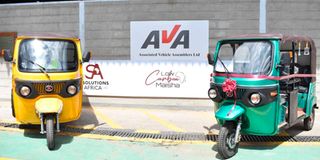Mombasa businessmen bet on eco-friendly electric tuk-tuk
In Mombasa, the classic three-wheel drive off-roader known as bajaji (Bajaj) or more commonly referred to as tuktuk, is one of the most affordable means of transport.
With the inflow of electric vehicles into the country, two friends in the coastal city have seen a business opportunity – producing electric tuk-tuks.
Their selling point? They are more environment-friendly, more spacious, and much cheaper to run.
The business partners, Alijawaad Molu, 23, and Aliakber Khan, 24, were classmates in high school.
Alijawaad would go on to study Bachelor of Science in Business Management and thereafter a Masters in Business Administration, while Aliakber studied BTEC Information Technology and ABE Business Administration.

Some of the electric tuktuk (E-Beba) being introduced in the Kenyan Market by Solutions Africa Limited after they were handed over to them at the Associated Vehicle Assembler plant in Miritini, Mombasa County on June 29, 2022.
Through their company, Solutions Africa, they have come up with a model of an electric tuk-tuk, their long-term vision to produce more eco-friendly products.
Better environment
They say the vision of the company revolves around working towards a better environment by reducing carbon emissions through going green, playing their part in reducing the effects of global warming.
They have named their tuk-tuk E-Beba. It is similar to the current three-wheelers in the market, though there are slight differences in their features.
Their model has zero emissions, less noise pollution and lower operational costs compared to tuk-tuks that use fossil fuel, especially with unpredictable fuel price changes currently being experienced in the country.
“E-beba tuk-tuk runs on batteries that come with a portable charger, it costs approximately Sh300 to fully charge the batteries, with full charging lasting about six hours.
Worth noting is that in a day, a tuk-tuk driver can spend at least Sh1,000 on fuel,” says Alijawaad.
He adds that in the future, they plan to introduce battery swaps to increase efficiency.

Solutions Africa Limited Proprietors Aliakber Khan (left) and Alijawaad Molu; the Mombasa duo behind the electric tuk-tuks (E-Beba) introduced in the Kenyan Market.
He points out that a normal tuk-tuk has three seats at the back and one at the front for the driver, however, this version can accommodate eight passengers.
“A family of more than three has to board two tuk-tuks, with this modified version, families can travel together,” says Alijawaad, who points out that their aim is not to try to replace the current tuk-tuk in the market, rather, introducing a more environmentally friendly solution.
Other than the transport sector, their other target audience is food delivery companies.
The duo say they have spent approximately Sh15million on the business idea, which took them eight months to implement. The money, they explain, was extended by a silent investor.
They source the parts from different original equipment manufacturers who supply them with completely broken parts which are then assembled in Kenya by the Associated Vehicle Assemblers (AVA), based in Mombasa County.
So far, 20 tuk-tuks have already been assembled, ready for launch in the second week of this month, with a target of 35 by the end of the month.
Electric tuk-tuk
The AVA Head of Operations, Moses Abiero, says this was the first electric tuk-tuk they have assembled, adding that the product is important to them now that they are looking into moving from fuel based engines into electric batteries.
“This has resulted in creation of more jobs, and we have also benefited from skills transfer,” says Mr Abiero, observing that the only challenge they are facing at the moment is the need for more skills from source manufacturers to their technicians.
He adds: “We have started talking and discussing about producing more electric tuk-tuks with our source manufacturers, as well as other products such as buses and minivans,” says Abiero, noting that the legislation and policies the government has put in place to support the locomotive companies are contributing to the growth of the industry.
With this in mind, Solution Africa is looking to launch 200 tuk-tuks in a year's time, with an eye on other products such as bodabodas and tourist minivans.
According to the International Energy Agency, electric vehicles account for five percent of global automobile sales, but to achieve zero emissions by 2050, electric vehicles will need to make up 60 percent of new automobile purchases by 2030.





